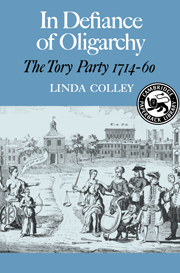Book contents
- Frontmatter
- Contents
- For my parents and Toby
- Preface
- Part I The Problem of Tory Survival
- Part II The Ingredients of Tory Survival
- Part III Single-Party Government Assailed
- 7 A Dark Hole with Blind Guides: 1714–24
- 8 The Twisted Threads of Party: 1725–41
- 9 Broad-Bottom Schemes and Princely Alliances: 1742–53
- 10 Acceptance and Dispersal? 1754 and Onwards
- Conclusion
- Appendix
- Manuscript Sources
- Notes
- Index
10 - Acceptance and Dispersal? 1754 and Onwards
Published online by Cambridge University Press: 03 February 2010
- Frontmatter
- Contents
- For my parents and Toby
- Preface
- Part I The Problem of Tory Survival
- Part II The Ingredients of Tory Survival
- Part III Single-Party Government Assailed
- 7 A Dark Hole with Blind Guides: 1714–24
- 8 The Twisted Threads of Party: 1725–41
- 9 Broad-Bottom Schemes and Princely Alliances: 1742–53
- 10 Acceptance and Dispersal? 1754 and Onwards
- Conclusion
- Appendix
- Manuscript Sources
- Notes
- Index
Summary
The death of Henry Pelham in March 1754 tends to invigorate political historians of the eighteenth century as much as the demise of Lord Palmerston does their nineteenth-century counterparts. Just as the consensual politics of the early 1860s supposedly gave way to a two-party competition for a Reform Act, so Pelham's complacent whig confederation and ‘unexciting useful measures’ are traditionally followed by the abrasive parliamentary rivalry of William Pitt and Henry Fox and the glamour and cupidity of empire. It was natural that contemporary historians should also have sought in the 1750s the genesis of the convulsions of George Ill's early reign. Predictably enough, they found it. Both John Almon and Horace Walpole claimed that the fragmentation of conventional whig and tory alignments in the 1760s - a fragmentation which gave the King much greater room for manoeuvre than hitherto - was already in process in the previous decade. Even in their own day, this thesis did not go unmodified. Walpole himself was later to date the abrogation of two-party distinctions from the Regency Crisis of 1765. Yet it is his earlier argument, that some of the structural changes usually attributed to George Ill's accession began in fact ten years before, which has recently been disinterred and lent the cosmetic of fresh complexity.
J. C. D. Clark has asserted that the mid 1750s witnessed a revolution in political arguments and alignments which culminated in the Pitt- Newcastle coalition of 1757 - a governmental amalgam so multifarious that it absorbed and obliterated the three parliamentary categories of tory, ministerial whig, and opposition whig which had been the parliamentary norm since 1715.
- Type
- Chapter
- Information
- In Defiance of OligarchyThe Tory Party 1714-60, pp. 263 - 289Publisher: Cambridge University PressPrint publication year: 1982



